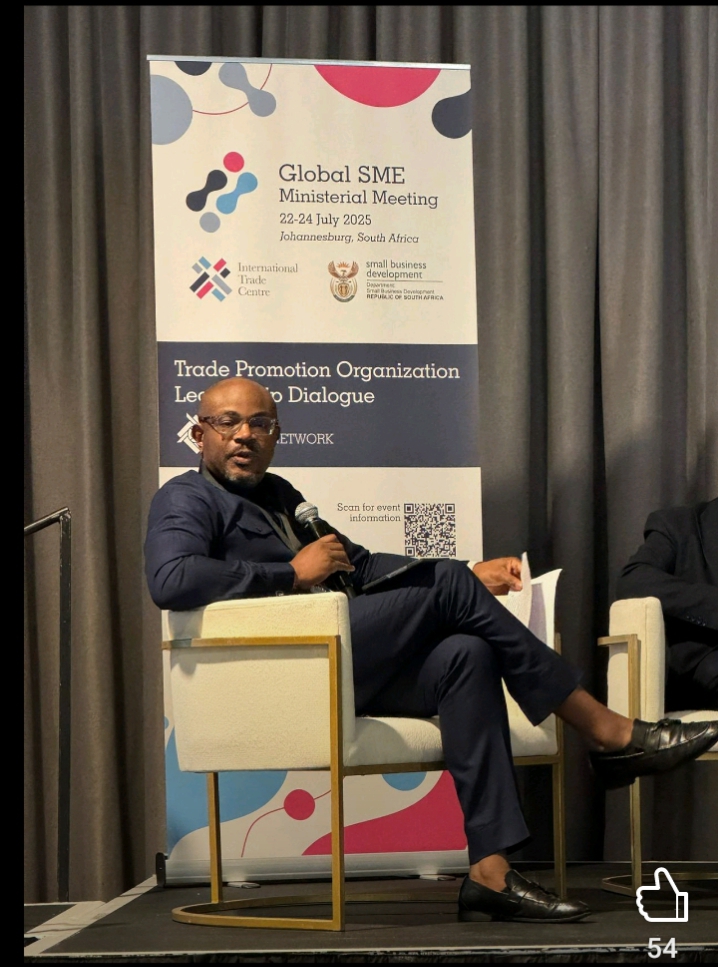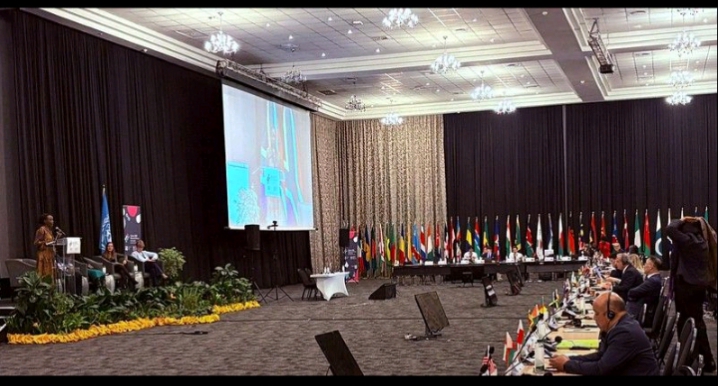ECOWAS Champions Trade Promotion Model at Global SMEs Ministerial Summit ,Unveils Bold Vision for AfCFTA and Economic Resilience.
By Raymond Enoch.
In an unprecedented gathering that signaled a bold new chapter for global economic collaboration, Johannesburg, South Africa, played host to the inaugural Global Small and Medium Enterprises (SMEs) Ministerial Meeting from July 22nd to 24th, 2025.
The summit, themed “Navigating New Business Frontiers,” brought together ministers, senior policymakers, trade development experts, and private sector leaders from across continents to confront the growing pressures facing SMEs amid rising geopolitical uncertainty and economic volatility. Organized by the International Trade Centre (ITC) in collaboration with South Africa’s Department of Small Business Development, the meeting was hailed as a critical step in rethinking the role of SMEs in building trade-driven economic resilience.

The current global climate, marked by inflation, supply chain disruptions, and tightening financial conditions, has placed extraordinary burdens on small businesses—often regarded as the backbone of national economies. It was within this context that the ministerial summit set out to offer pragmatic solutions and structural frameworks to safeguard and empower SMEs. Discussions focused intensively on three pivotal levers of transformation: Access to Finance, Digital Transformation, and the Green Transition. These areas were not merely viewed as policy buzzwords, but as urgent entry points for unlocking sustainable, inclusive growth across the SME landscape.

On the issue of access to finance, stakeholders recognized the long-standing barriers facing SMEs in securing affordable credit. Delegates proposed the expansion of blended financing models, de-risking instruments, and financial technology (fintech) applications tailored for small businesses in emerging markets. The need for ecosystem-level reforms was also underscored, particularly in regions where weak financial infrastructure continues to inhibit SME scale-up. Financing, however, was only one part of the equation. The integration of digital technologies into business models was widely acknowledged as a catalyst for growth. From digital payment systems to e-commerce platforms and artificial intelligence, the summit emphasized that digitalization is no longer a luxury—it is a lifeline for SMEs striving to access new markets and stay competitive under the African Continental Free Trade Area (AfCFTA).
The green transition was another key focus, with an emphasis on enabling SMEs to become active contributors to the global climate agenda. Participants called for policy frameworks that incentivize environmentally responsible practices while providing technical and financial support for businesses adopting clean technologies. With climate-related shocks becoming more frequent, the summit framed sustainability not only as a moral imperative, but as a strategic necessity for long-term economic survival and competitiveness.
Amidst these strategic dialogues, a standout intervention at the High Level meeting was delivered by Dr. Kolawole Sofola Director Trade ECOWAS Commission.
Speaking at a high-level awareness roundtable titled “Gateways to Facilitating Private Sector Gains for AfCFTA,” Dr. Sofola detailed the instrumental role of the ECOWAS Trade Promotion Organizations Network (TPON) in bridging regional trade gaps. He outlined how the network aligns with the broader ECOWAS Trade and Investment Promotion Strategy (ECOTIPS), designed to support private sector actors in accessing intra-African markets through AfCFTA. Dr. Sofola’s remarks were met with strong support, with delegates praising his clear articulation of how regional cooperation, institutional coordination, and policy harmonization can catalyze tangible private sector gains.
He stressed that AfCFTA’s success hinges not only on tariff liberalization, but on how effectively member states can prepare their SMEs to navigate new market environments, regulatory standards, and digital trade infrastructures. By empowering trade promotion organizations across ECOWAS to operate with shared intelligence and cross-border synergy, the continent could unlock an era of unprecedented SME-led growth. His call for action echoed throughout the summit halls—urging governments and development partners to go beyond commitments and begin scaling proven models of regional trade facilitation.
As the curtain closed on three days of dynamic exchanges, the Johannesburg summit concluded with a shared sense of purpose and renewed urgency. There was a strong consensus that SMEs are no longer just passive beneficiaries of economic policy—they are key drivers of innovation, job creation, and inclusive prosperity. What remains is a deepened commitment from both the public and private sectors to implement the strategies laid out, finance the necessary transitions, and ensure that Africa’s economic transformation is not merely envisioned—but realized.
In the wake of the summit, there is cautious optimism that with sustained political will, institutional backing, and private sector engagement, Africa’s SMEs can thrive amid the evolving global order. With AfCFTA entering a critical phase and regional frameworks like ECOTIPS gaining traction, the continent is positioning itself at the forefront of a new trade era—one where small businesses are no longer left behind, but instead, lead the charge toward resilient, sustainable growth.









